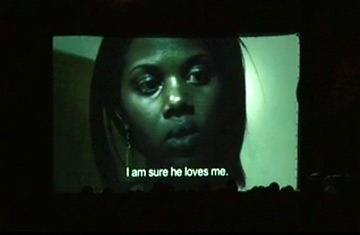
On the fifth day of the road trip, the van leaves Gyseni, a former colonial lake resort in the western province of Rwanda, and takes a bumpy and circuitous route to Kibuye, on the eastern shore of Lake Kivu. The driver constantly sounds his horn or drives frighteningly close to people to scare them off the road. The landscape outside is breathtaking: lush green hills, banana plantations and in the distance, the Virunga volcanoes, home of the famous Rwandan mountain gorillas.
When the van stops at Kibuye's stadium, it is surrounded by children, who watch in excitement as the huge screen is inflated. Thirteen years ago, this was the site of a massacre of tens of thousands of Tutsi — many of them buried in a mass grave adjacent to the stadium. That dark chapter of Kibuye's history is obliquely addressed in one of tonight's movies, about a love affair between a Tutsi girl and a Hutu boy. And the audience laughs and cheers, raucously rooting for the couple.
"I liked the movie very much," says Pauline, 27, who has brought along her little boy, Tiamo. "It talks about reconciliation, which is what people in this country need to hear about."
Eric Kabera is the man behind the Rwandan film festival, which is now staging its third season thanks to support from international sponsors. He hopes to turn Rwanda into a destination for international filmmakers, thus boosting the local economy. Certainly, a few internationally successful movies have already been made in and about Rwanda. And, as Culture Minister Joseph Habineza put it in his opening speech, "We have the best landscape, good weather, and speaking French and English also helps."
For Kabera, however, the most important aspect of the festival is Hillywood: "It is extremely important that we reach the rural areas, not only the urban middle class," he says. "In a country where 80% of the population can't read and write properly [the government estimates illiteracy at around 24%] movies can be an important tool to bring education to the people."
That idea is endorsed by Richard, who traveled three hours to attend the screening: "I work at a health care center and know many people that have died of AIDS, so I think it is important to educate people about this issue in a language that they understand." Still, not everybody shares Richard's appetite for movies with an educational message. Says Peter Habimana, 21, a bicycle taxi driver, "I prefer Jackie Chan."
